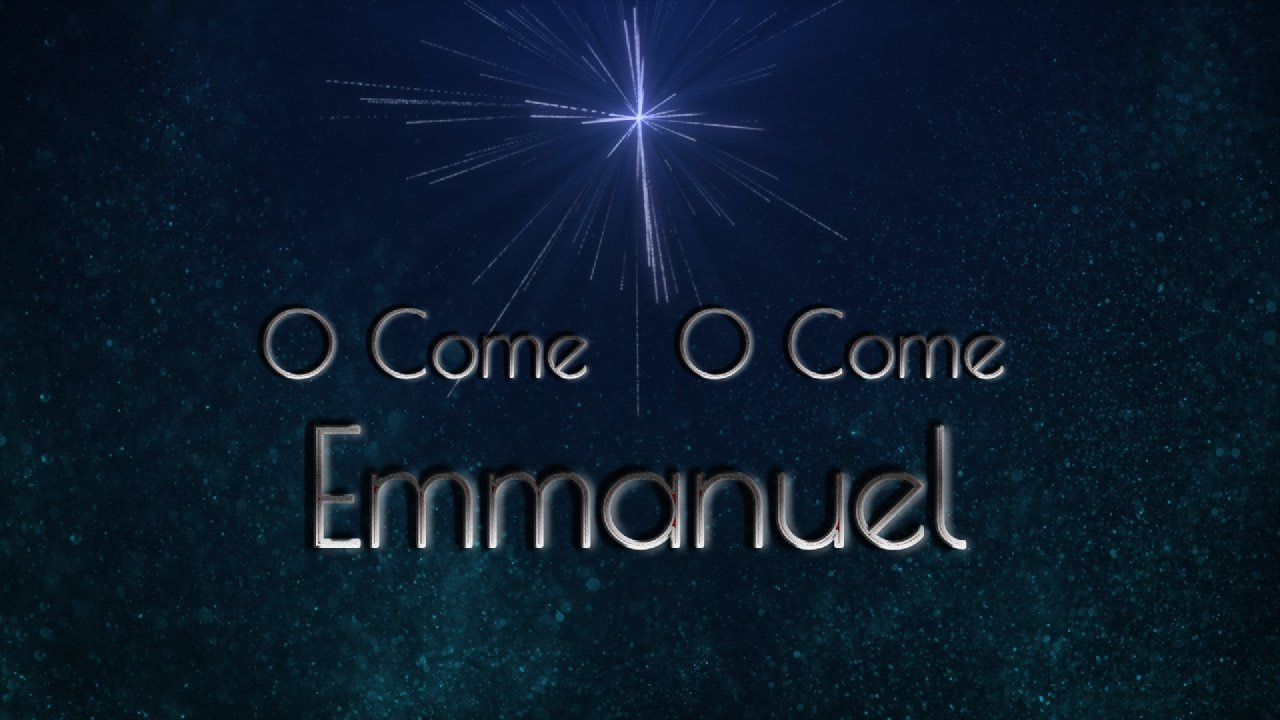O Come O Come Emmanuel is probably the oldest Christmas carol still sung today. This popular hymn dates back to the ninth century and represents an important and ancient series of services celebrated by the Catholic Church. It also presents the different biblical rollers that the church believed Jesus fulfilled.
The universal nature of faith presented in this song can now be best seen by the fact that it has crossed over from a hymn sung in Latin and used in only formal Catholic masses to a carol translated into scores of languages and embraced by every Christian denomination in the world.

The writer of “O Come O Come Emmanuel” is unknown. He was no doubt a monk or priest who penned the words before 800 A.D. He was also a scholar with a rich knowledge of both the Old and New Testaments. Once completed, the hymn was evidently picked up by many European churches and monasteries and became an intensely important part of the church. Yet for fifty-one weeks of each year it was ignored, saved for a single week of Advent vespers leading up to the celebration of Christ’s birth.

In its original form, “O Come O Come Emmanuel” was known as a song of the “Great Antiphons” or “Great O’s.” The initial Latin text, framed in the original seven different verses, represented the different biblical views of the Messiah. One verse per day was sung or chanted during the last seven days before Christmas.
Much more than the very simple, almost monotone melody employed at the time, the words painted a rich illustration of the many biblical prophesies fulfilled by Christ’s birth. So the story of “O Come O Come Emmanuel” is really a condensed study of the Bible’s view of the Messiah – who he was, what h represented and why he had to come to Earth. Even to this day, if one is a proficient Bible student, the song’s lyrics reveal the unfolding story of the Messiah.
For the people of the Dark Ages – few of whom read or had access to the Bible- the song was one of the few examples of the full story of how the New and Old Testament views of the Messiah came together in the birth and life of Jesus. Because it brought the story of Christ the Savior to life during hundreds of years of ignorance and darkness, “O Come O Come Emmanuel” ranks as one of the most important songs in the history of the Christian faith.

O Come O Come Emmanuel Gain Worldwide Acceptance
The song owes its worldwide acceptance to a man named John Mason Neale. Born on January 24, 1818, this Anglican priest was educated at Trinity College in Cambridge. Brilliant, a man who could write and speak more than twenty languages, he should have been destined for greatness. Yet many feared his intelligence and insight. AT the time, church leaders thought he was too evangelical, too progressive, and too much a free-thinker to be allowed to influence the masses. So rather than get a pastorate in London, Neale was sent by the church to the Madiera Islands off the northwest coast of Africa.
Pushed out of the spotlight and given the position of warden in an all but forgotten locale, it was expected that he and his ideas would never again find root in England. Yet Neale refused to give up on God or his own calling. On a salary of just twenty-seven pounds a year he established the Sisterhood of St. Margaret. From this order he began an orphanage, a school for girls, and a house of refuge for prostitutes. And these noble ministries were just the beginning.
When he wasn’t ministering to those who could truly be called “The least of these,” the often frail and sickly Neale reviewed every fact of Scripture and Scripture-based writing he could find. It was during these studies that he came across the Latin Chant, “O Come O Come Emmanuel” in a book called Psalteroium Cantionum Catholicarum. Seizing on the importance of the song’s inspired text, Neale translated the words into English. Interestingly, in his initial work, the lyrics began, “Draw nigh, draw nigh, Emmanuel.”
The tune that went with Neale’s translation had been used for some years in Latin text versions of the song. “Veni Emmanuel” was a fifteenth century processional that originated in a community of French Franciscan nuns living in Lisbon, Portugal. Neale’s translation of the lyrics coupled with “Veni Emmanuel” was first published in the 1850s in England. Within twenty-five years, Neale’s work, later cut to five verses and called “O come O Come, Emmanuel.” grew in popularity throughout Europe and America.
Although sung countless times each Christmas, much of the song’s rich meaning seems to have been set aside or lost. While both men – the ancient monk and the exiled priest – would probably be amazed that nay still remember their work, the fact that few realize the full impact of the words would no doubt disappoint them greatly. After all, to sing a song and not feel teh power and majesty of its meaning trivializes both the music and the lyrics.
The first verse of the song is taken from Isaiah 7:14 and Matthew 1:23. It introduces Emmanuel-“God with us” – and Israel as a symbol for the Christian world, held captive on a dark and sinful Earth.
Isaiah 11 serves as the theme for the verse that begins “O come, thou rod of Jesse, free” (in some translations this is called the “Branch of Jesse”). In it the rod of Jesse represents Christ, who is the only one who can defeat Satan and bring eternal life to all those who follow him.
“O come, O Dayspring, come and cheer” presents the image of the morning star, a concept that can be traced back to Malachi 4:2. In this verse, the song states that the coming Savior will bring justice, honesty, and truth. He will enlighten and cast out darkness. As Malachi promises: “The sun of righteousness will rise with healing in its wings.”
The lyrics then turn to “O come, thou key of David,” a reference to Isaiah 22:22. The words in this verse explain that the new born King holds the key to the heavenly kingdom and there is no way to get into the kingdom but through him.
The verse that begins “O come, O come, Adonai” (in some texts this reads “O come, thou wisdom from on high”) centers on the source of true wisdom. This comes only from God through his Son. Through the Savior, this wisdom can reach around the world and bring peace and understanding to all men. Thus, Christ’s teachings and examples fulfilled all Old Testament prophesies.
Even today, when sung in a public hall by a small group of carolers or during a television special, the original chants of long forgotten monks can almost be heard. Although translated into scores of languages and sung in a wild variety of styles and arrangements, the simplistic yet spiritual nature of the song remains intact.
It is reverent, a tribute to not only the birth of God’s child but also to the fulfillment of God’s promise to deliver his children from the world. n this simple but brilliant song, the echoed voices of clerics from the past gently urge today’s world to accept and worship the King who fulfills God’s greatest promise to his children.
O Come O Come Emmanuel songs and Versions
O come O come Emmanuel Chords
O Come, O Come Emmanuel lyrics
1 O come, O come, Immanuel,
and ransom captive Israel
that mourns in lonely exile here
until the Son of God appear.
Refrain:
Rejoice! Rejoice! Immanuel
shall come to you, O Israel.
2 O come, O Wisdom from on high,
who ordered all things mightily;
to us the path of knowledge show
and teach us in its ways to go. Refrain
3 O come, O come, great Lord of might,
who to your tribes on Sinai’s height
in ancient times did give the law
in cloud and majesty and awe. Refrain
4 O come, O Branch of Jesse’s stem,
unto your own and rescue them!
From depths of hell your people save,
and give them victory o’er the grave. Refrain
5 O come, O Key of David, come
and open wide our heavenly home.
Make safe for us the heavenward road
and bar the way to death’s abode. Refrain
6 O come, O Bright and Morning Star,
and bring us comfort from afar!
Dispel the shadows of the night
and turn our darkness into light. Refrain
7 O come, O King of nations, bind
in one the hearts of all mankind.
Bid all our sad divisions cease
and be yourself our King of Peace. Refrain
O Come, O Come Emmanuel Piano
O Come, O Come Emmanuel sheet Music
For More Information About “O Come O Come Emmanuel” Check out this Link…
O Come, O Come, Emmanuel – Wikipedia


